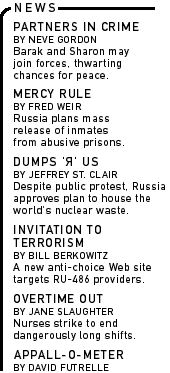

|

|

|

|
| |
|
|
|
More than a thousand angry listeners of radio station WBAI-FM packed a New York City union hall in late December in a show of support for that station's longtime manager and two other veteran employees who were suddenly fired over Christmas weekend and locked out of their offices. The dismissals, which were ordered by the Pacifica Foundation, WBAI's Washington-based parent group, mark the latest in a series of crises that have rocked the tiny nonprofit network for two years. Normally, radio listeners couldn't care less about who the manager of their favorite station is--forget about going out to a meeting on a frigid night to discuss the matter. But WBAI has always been a rare bird in the high-flying, fast-talking world of New York radio. For 40 years it has steadily remained the city's only leftist, radical, noncommercial station, occupying an increasingly valuable media platform right in the middle of the radio dial--at 99.5 FM. No matter the issue, if you wanted to hear a dissident opinion that could be found nowhere in the mainstream media or on those right-wing radio talk shows, you could always turn to WBAI. If you wanted to know where the next big protest in the city was, what the big unreported international story was, or what the latest innovative musicians were up to, you had to tune in. The same usually held true for Pacifica's other four affiliates in Berkeley, Houston, Los Angeles and Washington. Because all of the stations depend on volunteers and listener donations for their survival, they have always had the most loyal and passionate followings of any in the radio world. I should know. For nearly five years, I have worked as a part-time co-host on Pacifica's national morning news show, Democracy Now!, alongside the network's best-known journalist, Amy Goodman. Even as the for-profit radio empires grew, as stations cut back on staffing and news programming became more tepid and homogenized, WBAI and the other Pacifica stations somehow managed to buck the trend, with reporting that forced those in power to react. Sometimes the reports were strident in tone or insufficiently researched, but often they were far ahead of the commercial stations, and they always reflected the deep commitment of Pacifica reporters delivering important stories to the American public. But now Pacifica, which has always prided itself on the democratic way it functions and how it involves community advisory boards in decision-making, has started to ape the authoritarianism of its capitalist counterparts. Nearly two years ago, a crisis erupted at the Berkeley station after the board dismissed a popular station manager. When staff members and the local community objected, scores were arrested for trespassing and the network locked out the staff and temporarily shut down the station. That led to thousands of people surrounding the station in a string of protests, to lawsuits and to local politicians launching investigations of Pacifica's operation. While Pacifica's board eventually relented, reopened the station and brought back most of the employees, it did not change its manner of operation. During that crisis, a memo surfaced from a Pacifica board member that mentioned the possible sale of the Berkeley station or WBAI--each could be worth as much as $100 million on the open market--to raise funds for the cash-starved network. The board has since renounced that memo, but many critics still fear a possible sale, especially since some recent additions to the board since the Berkeley crisis are far more oriented toward the corporate media world than the social activism roots of previous Pacifica board members. Then came the firings at WBAI that many are calling the Christmas coup. Gone were station manager Valerie Van Isler; program director Bernard White, who has been with the station for more than 20 years; and Sharan Harper, a producer of White's popular "Wake Up Call" morning show. In Van Isler's place, the board installed Utrice Leid, the host of another popular talk show. Leid's appointment has sharply divided the staff as well as the listeners, especially because she took over in the middle of the night, changed the locks in the station, banned several longtime producers from entering and brought in security guards. "This is an internal matter," Leid told me in early January. "Some people have imperiled this station by their singular, rash, individual actions," she added, refusing at the same time to elaborate. In several on-air appearances since then, however, and in meetings with WBAI staff, Leid has suggested that White, Harper and others who were tossed from the station were being manipulated by Amy Goodman, and that Goodman has secretly orchestrated a public campaign against the Pacifica board and concocted a non-existent political schism merely to mask her own inability to accept supervision by anyone at Pacifica. This attempt to turn a deep and long-simmering conflict--one that has spread throughout the network and involved thousands of people--into the personal machinations and fantasies of a lone individual would be laughable were the stakes not so serious. Pacifica, an organization founded by pacifists, is being rapidly
turned into a network at war over democracy. Only, as Berkeley showed,
in this war it's the listeners and donors who will have the last
word.
|

